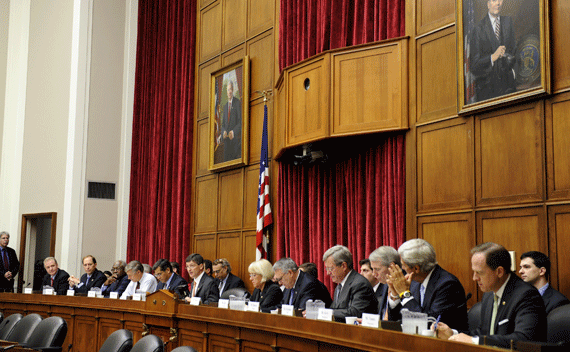Friday File: The Super Committee Has Forty Days
More on:

Above the Fold. The congressional super committee created by the August debt ceiling deal has just forty days to generate a plan to cut the U.S. government’s projected ten-year deficit by at least $1.2 trillion. If the committee succeeds, its plan goes to the House and Senate for an up-or-down vote. If the committee fails, then we are headed for sequestration—across-the-board spending cuts split evenly between defense and domestic programs. Leon Panetta has called further defense cuts“nuts,” and Army Chief of Staff Gen. Ray Odierno says he is “deathly afraid” of sequestration. DoD won’t have to wait until Thanksgiving to find out whether a deal will get made. Why? Because the Congressional Budget Office must “score” any deal to certify that it provides the required amount of deficit reduction. Crunching the numbers could take a couple of weeks, so any deal needs to be done by early November. Will we get a deal? Don’t bet on it. Tax increases remain the sticking point, with Democrats saying yes and Republicans saying no. Either side could blink. But even then the story is far from over, and not just because the full House or Senate could reject the plan. Unless the super committee does the unlikely and proposes a “grand bargain” similar to the one that President Obama and Speaker Boehner flirted with this summer, the fiscal battle will simply resume after the holidays. That’s because Washington needs to reduce its projected ten-year deficit by at least $4 trillion to stabilize the overall level of debt and put it on a downward slope as a percentage of GDP. So the super-committee process is at best just one stop on a longer journey.
CFR Event of the Week. Last week marked the tenth anniversary of the start of the war in Afghanistan. To observe the anniversary, CFR invited legendary news anchor Tom Brokaw to sit down with Gen. Stanley McChrystal, U.S. Army (Ret.), to discuss the success of U.S. efforts in Afghanistan and what is likely to happen in the future. McChrystal noted that the United States continues to face difficulties in creating a stable and legitimate Afghan government and said that “we still don’t know enough” about Afghan culture and history. You can download the audio of the talk to listen at the gym, watch the video below, or read the transcript.
Read of the Week. Republican Party luminaries have been moving to endorse Mitt Romney for president, even though recent polls show Republican voters becoming infatuated with Herman Cain. Assuming that the luminaries are correct that Romney will be the GOP nominee, get a jump on everyone else and check out his new foreign policy white paper, “An American Century: A Strategy to Secure America’s Enduring Interests and Ideals.” If you don’t have the time or patience to read the full forty-three page report, the Romney campaign has helpfully provided a three-page fact sheet that hits the strategy’s highlights.
Blog Post of the Week. The Atlantic’s James Joyner has already read Mitt Romney’s strategy white paper. His conclusion? Romney’s realist foreign policy is a lot like Obama’s. (Dan Drezner gives the white paper a B, while Ian Bremmer thinks it is more nostalgic than realistic.)
Poll Question of the Week. The Occupy Wall Street protests have focused attention on the question of inequality in the United States. Which prompts a question: Do Americans think that the country is divided into two groups, “haves” and “have nots”? Pew Research Center asked this question last month and found the country split, with 52 percent saying no and 45 percent saying yes. Not surprisingly, far more Democrats (59 percent) say yes than do Republicans (27 percent).
Chart of the Week. Americans pride themselves on the belief that anyone living in the United States can rise from rags to riches. So normally you expect Republican presidential candidates to champion the Horatio Alger story. Yet at this week’s GOP presidential debate in New Hampshire, Rick Santorum said: “I just read a recent study that income mobility from the bottom two quintiles up into the middle income is actually greater in Europe than it is in America today.” The former Pennsylvania senator got his facts right, as the chart below shows. It’s also worth noting that it is harder to fall into poverty in Europe than in the United States.
Chart source: The Brookings Institution (pdf) via "Wonkblog."
Too Good Not to Note. Dan Drezner asks what a speech on economic statecraft, like the one Secretary of State Hillary Clinton delivered this morning, can accomplish. Joe Nye says that the greatest foreign threat to the President Obama’s re-election comes not from Afghanistan or Yemen, but from Europe. David Rothkopf sees five big questions raised by the alleged Iranian assassination plot. Dave Weigel explains why Herman Cain and the 9-9-9 plan appeals to so many Republicans. Nouriel Roubini argues that Occupy Wall Street and similar protests around the world reflect the fears that the world’s working and middle classes have about their future in the face of the growing concentration of power among economic, financial, and political elites. Masters in Environmental Science offers up twenty cool infographics on climate change.
Perils of Prediction. “You ain’t goin’ nowhere son. You ought to go back to driving a truck.” Jim Denny, manager of the “Grand Ole Opry,” when he fired Elvis Presley after one performance in 1954. Elvis went on to become, well, Elvis.
Quote to Ponder. ”We, the people, are the boss, and we will get the kind of political leadership, be it good or bad, that we demand and deserve.” John F. Kennedy, Profiles in Courage.
A Reason to Smile. Giant pumpkins.
More on:
 Online Store
Online Store
